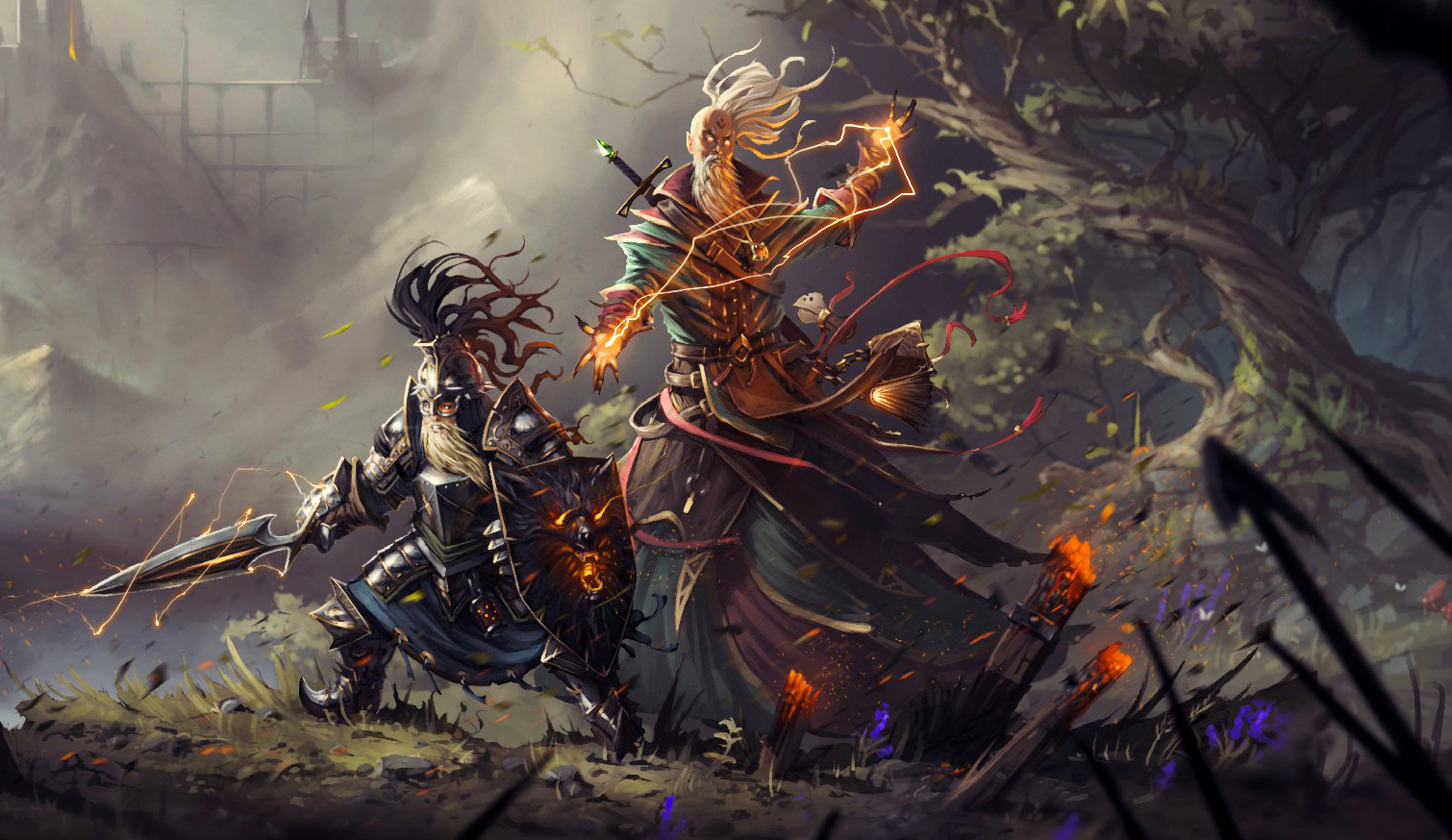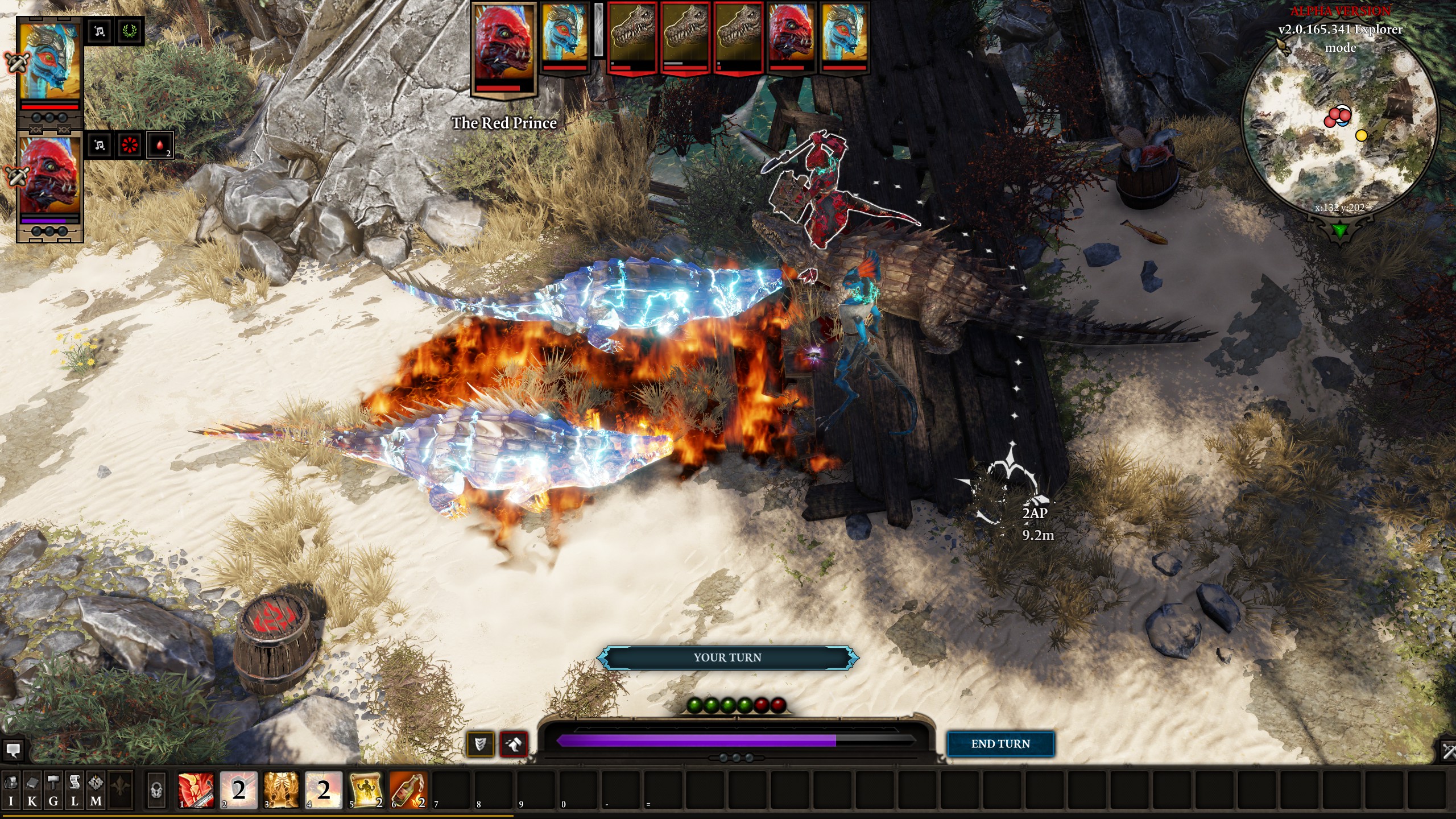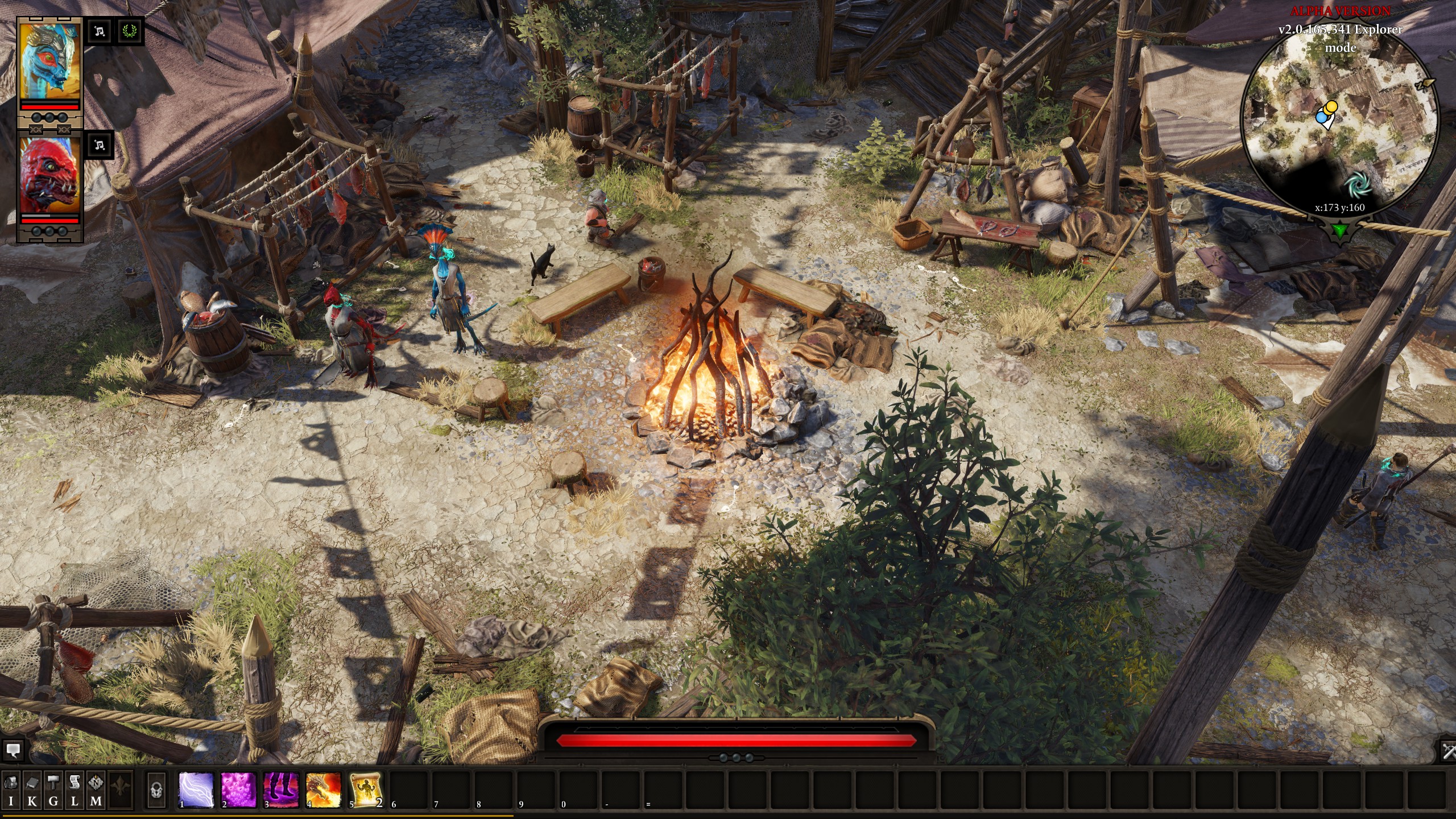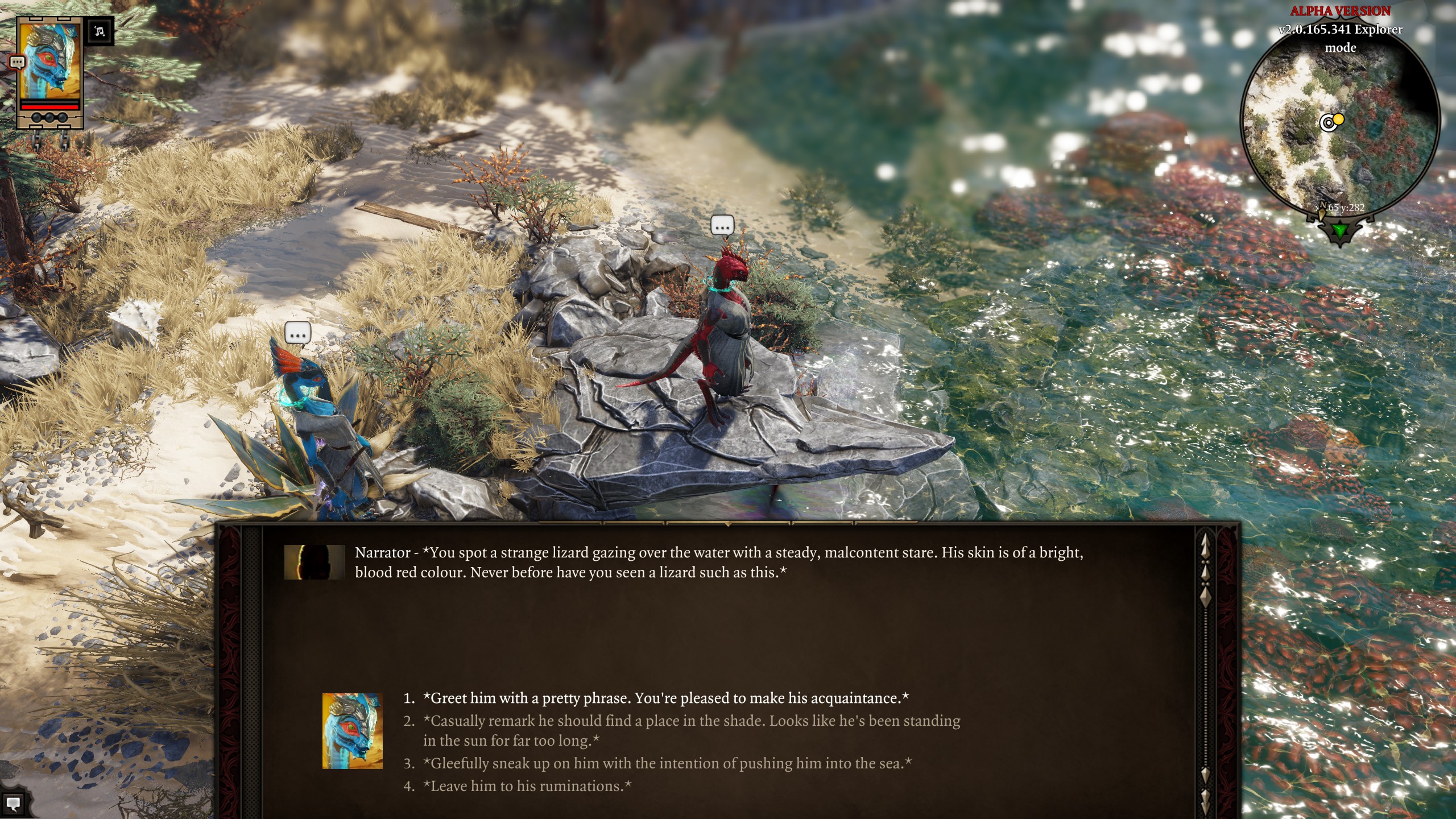How Divinity: Original Sin 2 will evolve in Early Access
Combat balance and system tweaks galore, Game Master mode, and more are on the way.

Something always goes wrong when you launch a game, says Larian Studios founder Swen Vincke. You wouldn’t know it by looking at Divinity: Original Sin 2’s Steam page a week after it launched in Early Access, where it’s sitting at 96 percent positive reviews. But something did go wrong when Larian released Original Sin 2 on September 15: they all forgot to press the launch button.
“For some reason we forgot to push the button, literally,” Vincke said, laughing over Skype. “That’s no joke. In the past you had to ask Steam to release it and they’d release it for you at the appointed time. Now they have a system where you put in the date and time, and so we thought it would just release automatically. But apparently you have to still type in that you want to release. So we were waiting there, together with everybody, waiting for it to release, and nothing was happening. We felt really stupid. [laughs] Goes to show, you should always read the fucking manual!”
Still, things were looking good after that minor setback—better than expected, according to Vincke, with hundreds of positive reviews coming in alongside lots of player feedback. “From the point of view of a game developer you can’t wish for better, actually, when going to Early Access,” he said.
Larian is no stranger to Early Access. A lengthy beta period was crucial to the first Divinity: Original Sin’s success, even though working on the game for so long nearly led Larian to bankruptcy. But the gamble paid off big, and Vincke attributes much of that success to the feedback they got from Original Sin’s Early Access players. Now that Larian is starting that process all over again, I wanted to know how the players would help them shape Original Sin 2.
Below we talk about balance changes, VO plans, the most surprising feedback, and more.
How Larian collects feedback
PC Gamer: Let’s start with things that you already had in mind that might need to change, and the feedback that’s influencing you in one direction or another.
Swen Vincke: There’s two parts to the question: What feedback are we looking at, and what do we do with it?
Keep up to date with the most important stories and the best deals, as picked by the PC Gamer team.
We obviously have the channels like forums and Twitter that we’re reading. Everybody’s reading a lot of it. We’re filtering things that we think are useful out of that. On one side that’s bug reports. Things are going wrong, there’s so much you can do in the game. On the other side there’s opinions and suggestions. Lots of good suggestions. Those go in a database and we go through it and say, ‘that makes sense, that’s actually better than we were planning.’
At the same time we’re also doing qualitative analysis. We have a little tool that’s shipping with the game, so people that want to can send data back to us. The data contains, ‘Where did you go in the game, what skills did you pick, what tags did you select, which dialogue options did you do?’ So it gives us more analytical data about what people are doing in the game away from the subjectivity of an opinion. That is dominantly being used for balancing, so we can see that if nobody’s managing a certain fight, then we probably overdid it on that fight. But also, if nobody is using a certain skill, it means we probably should do something about that skill.
Tweaking game balance
Are there any specific changes to the combat system that you already have in mind to balance from the data you’ve collected so far?
Vincke: I’m actually waiting for the full [qualitative analysis] report, so I’m very curious. From what I’ve seen in the customer reviews, I think it’s already pretty on point. We get a lot of people complaining that it’s too hard, so that’s a good thing. [Laughs] Some fights are too hard, I know. The thing that’s still going to evolve tremendously over the next couple of months is the AI. We have a lot of plans for improving the AI, so that’ll be interesting to see, how that’s going to affect what people think of combat, if it’s too hard or too easy.
We want to make it challenging, so we changed systems so that it would stay challenging throughout the entire game, something we didn’t really succeed with [in Divinity: Original Sin]. This is actually one of our big ambitions. So that once you think you’ve mastered it, something new kicks in and you think, ‘Shit, now what am I going to do?’ So if you have that sentiment continuously, you’ll have that sense of character growth going on continuously, so that’s really a big ambition of Original Sin 2. We’re going to be experimenting with tweaks and doing things, but overall, from what I’m seeing so far, it looks like it’s being picked up and enjoyable for players. But I haven’t seen the data, so everyone could be rage quitting after two hours, you never know.
This is the hard part with analyzing Early Access data. A lot of people are forcing themselves to quit after two hours because they don’t to spoil themselves for the full game. But I think we have sufficient people finishing it to at least be able to draw our first conclusions.

Choosing who to listen to
How do you balance the minority voice against the majority of responses?
Vincke: It’s not a democracy. There’s still direction going on. In this particular case, I’m the director of the game. I will do as I feel makes the most sense. Obviously I’ll let my choices be influenced by seeing people having fun, which is a thing that interests me. Even if I may agree with a one percent opinion, I’m not necessarily going to change it if I think it will change other things or be wrong for the production. You can’t ever have everything perfect in one game, so you’ll just take something to the next game.
Sometimes you do read posts of people that are going against the majority, but are actually right, and if you did it the game would be better, but you just can’t do it anymore. You know as a game developer that if you do that, even if 98 percent say ‘no, it’s a bad idea,’ once they see it they would say ‘oh my god, this is a really good idea.’ That’s how innovation happens.
Another rule you have when dealing with feedback from players: if they’re making a lot of noise about a certain thing, they’re not necessarily going to offer you the right solution to it. It might be a symptom of something else that is wrong, potentially in a completely other system, and they don’t see what the connection is. If you start trying to test every single idea against what the audience is thinking, you’re not going to make anything anymore. That’s why choice has to be made.
Changes throughout Early Access
Are you going to be adding whole acts eventually over time until you hit the final game, or is Divinity: Original Sin 2 in Early Access a testbed, and you’ll drop the full game when it’s done?
Vincke: We’re going to be adding in features for sure. Extra skill trees are going to be added in. The super-secret Game Master mode is going to hit in Early Access also. That’s a very new thing, so we need to do a lot of testing with it. We’re really trying things there. But content-wise, we’re going to keep it on act one. I’m pretty sure we’ll add some things on top of act one. There’s this tutorial opening section that’s missing right now, just before you arrive on the island. We don’t want to spoil it too much for people that are participating in Early Access, so we want to give them sufficient content—the large majority of content, actually—on release.
Sometimes you read posts that are going against the majority, but are actually right, and if you did it the game would be better, but you just can’t do it anymore.
Swen Vincke
We have people that are going to be participating in closed betas also for the latter parts, so what you’re going to be seeing is Game Master mode, new skill trees, lots of extra permutations on systems, probably some surprises that I don’t even know myself yet. New things that we’re trying in the arena mode also, because that seems to be picking up quite well. We’ll see what we do with that. That will probably take us close to release.
What you’re going to be seeing in the foreseeable future is permutations on the character system we have. We’re not afraid—we did that in Original Sin 1 also, by putting system A in one week and system B in the next week, and see what works best for players—that’s how we’ll try to converge to a better system than what we’ve concocted while we were working in isolation. This is the cool part about Early Access, you can do these kinds of things. It takes some effort, but it’s rewarding for the players that are not participating in Early Access, or just try it out a little bit and will be playing it later, they’ll get a lot of benefit from this phase of experimentation.

A/B testing systems
You mentioned putting in one version of a system, see how it works, then swap it out for something else. Can you talk more about that?
Vincke: There are a couple stats and abilities we’re experimenting with. Memory is a very big experiment. We’re getting lots of opinions on Memory, so you’ll probably see Memory in different forms inside the game, to see what works better. The same with how skill abilities affect the skills, there’s going to be things we change there. When we did the original game, if we didn’t change it 20 times, I don’t know. We changed it a lot as we were experimenting.
But it’s good, because there’s players out there that play so many games, and the feedback you get from them is sometimes really good ideas. We gave them a couple new mechanics, so they’re fooling around with that now, they’re starting to learn them, form their opinion of them, so based on that feedback we’ll see what happens when we put it in there.
The goal is to create more fun. It can be something as stupid as increasing the drop rate of treasure by 1 percent or decreasing it, even.
There’s no objective quantitative measure of fun, but when you do this job for quite some time you can see if players are having more fun or less fun. The goal essentially is to create more fun. It can be something as stupid as increasing the drop rate of treasure by 1 percent or decreasing it, even, that can create more fun. How do you balance loot? It’s essentially a bunch of numbers in an Excel file. You see people complaining they’re not finding enough, then you give them more and people say the loot is so boring. You just iterate.
There’s a fine balance to be found. Even the version that’s out there right now, there’s two tests going on. One is at the very opening you almost get nothing, so you have to scavenge, and then afterwards you get quite a lot, so we’ll see what it does to players.
One real good measure, and this one we can measure objectively, is: do people put points in their stats? The moment that they stop putting points in them, it means they don’t need them anymore. That means we have to change something. The moment I stop caring about putting a point in an ability, something’s wrong with the balance. I should always be looking forward, ‘I need that point, I need that.’ The moment people stop bartering, something’s wrong, we’re giving too much. That we are measuring.

The most surprising feedback
What’s surprised you, so far? Anything specific you can call to?
Vincke: There were some people that didn’t like the physical and magic armor, and that surprised me. I thought it was a major improvement to the game. But they had a particular tactic that they had in the previous game they can’t anymore, now. What also surprised me, I thought what we did with the skill abilities made a lot of sense, and that the previous system was very confusing, but a lot of people apparently were very attached to the previous system. I thought that was going to be universally liked, but apparently it’s not the case. Goes to show.
There’s a lot of VO work being evaluated right now. The success in Early Access, together with the almost universal demand for VO, is definitely making us look at VO in a more extensive way than we originally planned. We always planned to have some of it, but I guess we spoiled them with Enhanced Edition, and didn’t realize that spoiling them with Enhanced, now we’re bound to do the same stunt with Original Sin 2. We’re looking at it. We didn’t plan on it, but it’s a complicated option.
Here’s another bit of surprising feedback, by the way. The third-person [view] that we’re using in the dialogues, it fits well with roleplaying and the origin system we’re doing. We’re getting resistance to that from certain corners. I’m interested to see if that is universal resistance or just a couple people who don’t like it. When we were running tests and playing it, some people thought it was strange but after five minutes decided they liked it more because there’s more expressivity, more stuff you can do in the dialogues. Now when you start talking about voiceovers, life gets really interesting with a system like that. So we’ll have to see.

Wes has been covering games and hardware for more than 10 years, first at tech sites like The Wirecutter and Tested before joining the PC Gamer team in 2014. Wes plays a little bit of everything, but he'll always jump at the chance to cover emulation and Japanese games.
When he's not obsessively optimizing and re-optimizing a tangle of conveyor belts in Satisfactory (it's really becoming a problem), he's probably playing a 20-year-old Final Fantasy or some opaque ASCII roguelike. With a focus on writing and editing features, he seeks out personal stories and in-depth histories from the corners of PC gaming and its niche communities. 50% pizza by volume (deep dish, to be specific).

